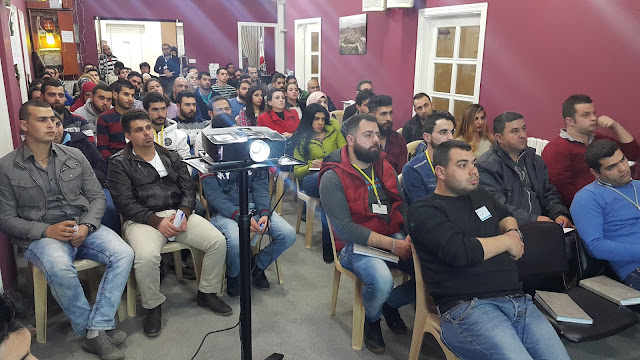Some women in Baalbeck-Hermel are competing against the timer of the municipality elections either to elect or to be candidates. As they have plethora of questions on how to make their dreams come true, the Lebanese Organization of Studies and Training (LOST) and GIZ decided to empower them. For this reason, a senior delegation from GIZ paid a visit to LOST’s centers in Bedneyel and Baalbeck to launch a joint project entitled “Empowering Women to Lead” (EWL) in Baalbeck on February 25, 2016.
GIZ in Bedneyel
The delegation, together with LOST’s founder, Dr. Rami Lakkis, conducted a meeting with some activists, municipality members, and mayors from the region at LOST premises in Bedneyel. The discussion was centered on exploring possible ways to make women part of the political life in which women can contribute to solving problems in their communities. A municipality member said, “We believe that women are better than men in multi-tasking, so we need active NGO support to elicit this dormant potential in the region.” The stakeholders extolled LOST’s role in empowering women in different aspects. One of the women said, “I have been teaching generations the importance of participating in public issues for 15 years without having any idea about the details of making this participation true. Now, with LOST’s awareness raising activities and training, I’ve got enough confidence to make a political plan and run for municipal elections.” In response, Dr. Rami Lakkis appreciated the women’s conscientiousness and expressed how proud he is of such participants whose inchoate steps can be a breakthrough in the women’s status quo in the region. The head of GIZ delegation, Sabine Gürtner, noticed the participants’ impression about LOST’s fingerprint and said, “We are proud to work with LOST to engage women in the political life. We are having a set of forthcoming projects in which we consider LOST a reliable partner to work with.”
With Baalbeck city activists
Afterwards, GIZ delegation headed toward Baalbeck to meet a group of stakeholders and key figures of the city including the Mufti and the Bishop of Baalbeck. The key pivot of the discussion was the Syrian influx and its impact on the region. The Mufti raised alarms on the lack of funding for the increasing needs of the Syrian refugees and their hosting community. He invited Germany to play an active role in this aspect “not to remain the Syrian’s dreamland to immigrate to,” according to him. The Archbishop thanked GIZ for taking Baalbeck-Hermel into consideration and demanded the delegation to establish job opportunities and be a part of the developmental process in the region. One of the mokhtars pointed at the profligate spending of the assistance for the refugees, which results in tensions among them and among the Lebanese citizens. The delegation learned more about how the Syrian influx is getting the already-vulnerable city more impoverished at different levels; infrastructure, water, electricity, and work competition, which triggers more social instability.
EWL launching ceremony
GIZ delegation joined LOST’s EWL launching ceremony in which more than 200 participants in the project, in addition to 400 more women, were present. Dr. Rami Lakkis gave a speech in which he stressed the values of LOST in the public work. He encouraged women to participate in the political life; “You are not alone; LOST is always beside you to make your presence a qualitative rather than a quantitative one.” He also pointed at how women’s grit can play an active role in dealing with the Syrian influx and its effects. “You are the ones who can lessen terms like “We” and “They” via instilling the true qualities of accepting the other in the society in your children’s minds. It’s you who can cultivate the principles of peace building and social stability in a simmering region like ours,” he said.
The governor of Baalbeck-Hermel, Bashir Khodor, had a speech in which he expressed his complete support to LOST’s projects which match “the genuine needs of the community,” according to him.
The head of GIZ delegation, Sabine Gürtner, delivered a speech to express her gratitude for the participants for their presence and efforts. She was sanguine about future chances of ongoing cooperation with LOST as a credible partner.
In some ways, it is to worry as much if not more about the possibility that empowering women remains on the back burner if LOST and GIZ aren’t present to keep their partnership ongoing to take care of the women’s needs and back them up to take lead positions in their communities. Women who are being supported by LOST and GIZ need a continuous process of empowering to reach tangible results in the future.
















